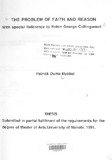| dc.description.abstract | The initial chapter of this thesis embraces a deliberation on the
aim, method, justification and significance of the research. Besides, it
includes the views of certain eminent philosophers of the past concerning the
issue at hand, that is, the problem of faith and reason.
Subsequently, I have endeavoured to explain the various significations of
"faith" and "reason" in chapter two and three, respectively, and with a view to
clarifying their meanings further. Chapter two lays emphasis on the nonreligious
aspect of faith while chapter three exemplifies the role played by
reason in logic. Here reasoning is defined as a process or an activity of the
mind in which there is a transition from Other premises to the conclusions.
Chapter two deals generally with faith in absolute terms, that is, faith as a
genus of the different species of faith.
In analyzing the concept of faith and reason, I have used deductive logic
mainly. My approach to this issue is deductive rather than inductive. And in
chapter four I have supported the view that faith and reason are natural and
necessary mental states. This is also the view of Robin George Collingwood
(1889-1943), an English historian, archaeologist and philosopher of no mean
achievement. But I have also criticised the author's association of reason with
emotion in his classification of the different aspects of reason. I have
argued, instead, that emotion and reason are opposites.
But in chapter five, I have moved on to the discussion of the various
arguments for the existence of God because they have a special significance
and relevance to the problem of faith and reason. All of them try to show,
in one way or the other, that faith in God is justifiable. They purport that
the existence of God can be proved by the use of reason in combination with
faith. Chapter five demonstrates the way religious men have applied reason
in order to understand, or to rationalise belief in God.
The point is that these arguments can be used to show that faith and
reason are compatible ideas because in them faith and reason have been
combined. Perhaps, it would be more accurate to call them explanations, rather
than proofs, of God' existence because, in the final analysis, they do not
establish God's existence beyond any reasonable doubt, particularly to a
person who is not already a believer. May be only a real encounter between
the atheist and God could possibly convince the former of the latter's
existence. Now, I have considered three different view concerning the possible
proof of the existence of God. First, that God's existence can be proved;
secondly, that God's existence can not be proved and thirdly, that God's
existence cannot be disproved. And I have settled for the view that it can
neither be proved nor be disproved.
The third view consists of a double negative or a negation of the
negation, that is, "cannot be disproved". Of course, this does not mean that
God's existence can be proved, which is the first statement. Rather, it
means that God's existence is self-evident to the extent that no evidence can
disprove it. But my position in this thesis is not just that God's existence
can not be disproved. Rather, my view here is that God's existence is a
matter of faith. And as such, it transcends the limitations of any proof by
rational inquiry. My view is summarised in the second statement above, that
God's existence can not be proved because it is above reason. And this
statement is positive rather than negative.
Finally, Chapter six tries to reconcile faith and reason with respect
to the problem of evil. Here, I have stated that the problem of evil purports
that it is quite unreasonable to believe in the existence of an omnipotent,
omniscient and all - good God when evil is still a factor in the world.
However, I have argued at the same time that the problem of evil does not
destroy faith in God completely because there are some other ways of explaining
away the problem of evil without necessarily resorting to atheism. For
instance, what is reasonable for the unbeliever may not necessarily be
reasonable for the believer, let alone for God.
My conclusion concerning the problem of faith and reason is that both of
these are interdependent characteristics of the mind. As such, they are
equally significant for cognition. But more specifically, my thesis is that
it is secular faith which is as indispensable as reason in the universal sense.
For one can be rational but still lack religious faith. However, none can do
without non-religious faith and remain rational. | en |

